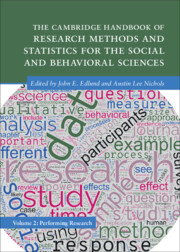 The Cambridge Handbook of Research Methods and Statistics for the Social and Behavioral Sciences
The Cambridge Handbook of Research Methods and Statistics for the Social and Behavioral Sciences Book contents
- The Cambridge Handbook of Research Methods and Statistics for the Social and Behavioral Sciences
- Cambridge Handbooks in Psychology
- The Cambridge Handbook of Research Methods and Statistics for the Social and Behavioral Sciences
- Copyright page
- Dedication
- Contents
- Figures
- Tables
- Contributors
- Preface
- Part I Quantitative Data Collection Sources
- Part II Important Methodological Considerations
- 9 Reliability
- 10 Measurement Validity in the Social and Behavioral Sciences: Some “Whys” and “Hows”
- 11 Statistical Power: How Not to Miss What’s Right in Front of You
- 12 Interdisciplinary and Integrative Research
- 13 The Importance of Replication
- 14 The Inner Workings of Registered Reports
- Part III Self-Report Measures
- Part IV Behavioral Measures
- Part V Physiological Measures
- Part VI Qualitative Data Collection Sources
- Index
- References
12 - Interdisciplinary and Integrative Research
from Part II - Important Methodological Considerations
Published online by Cambridge University Press: 12 December 2024
- The Cambridge Handbook of Research Methods and Statistics for the Social and Behavioral Sciences
- Cambridge Handbooks in Psychology
- The Cambridge Handbook of Research Methods and Statistics for the Social and Behavioral Sciences
- Copyright page
- Dedication
- Contents
- Figures
- Tables
- Contributors
- Preface
- Part I Quantitative Data Collection Sources
- Part II Important Methodological Considerations
- 9 Reliability
- 10 Measurement Validity in the Social and Behavioral Sciences: Some “Whys” and “Hows”
- 11 Statistical Power: How Not to Miss What’s Right in Front of You
- 12 Interdisciplinary and Integrative Research
- 13 The Importance of Replication
- 14 The Inner Workings of Registered Reports
- Part III Self-Report Measures
- Part IV Behavioral Measures
- Part V Physiological Measures
- Part VI Qualitative Data Collection Sources
- Index
- References
Summary
This chapter describes a common set of challenges faced in interdisciplinary research and strategies for addressing each of these challenges. These strategies are shown to be quite distinct from the disciplinary methods addressed in other chapters in this Handbook. Importantly, strategies are outlined for several distinct steps in the interdisciplinary research process. A set of challenges associated with team research is also identified, and a set of strategies for addressing these is presented. Having described how interdisciplinary research is performed, we are then able to clarify our definition of interdisciplinarity. The chapter closes with discussions of the relationship between interdisciplinarity and creativity, appropriate standards for evaluating interdisciplinary research, important concerns regarding the impact of interdisciplinary research on career progress, and the value of employing integrative strategies within disciplines. In all, the chapter urges a symbiotic relationship between specialized and interdisciplinary research.
- Type
- Chapter
- Information
- The Cambridge Handbook of Research Methods and Statistics for the Social and Behavioral SciencesVolume 2: Performing Research, pp. 261 - 282Publisher: Cambridge University PressPrint publication year: 2024
